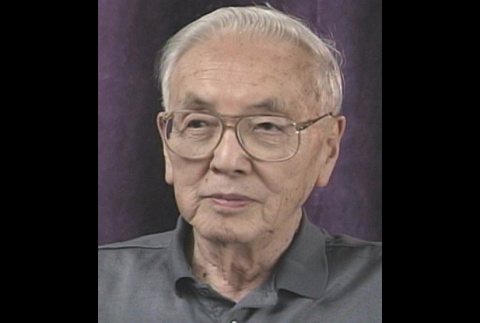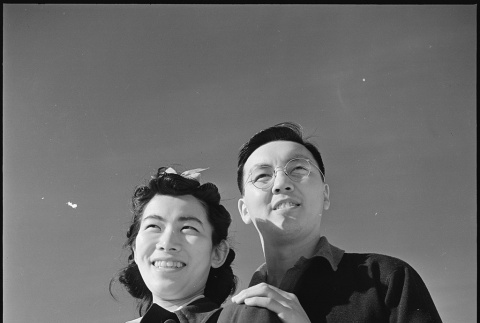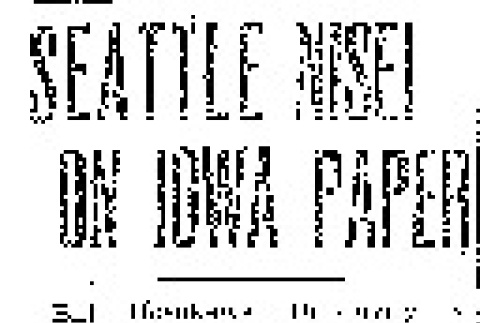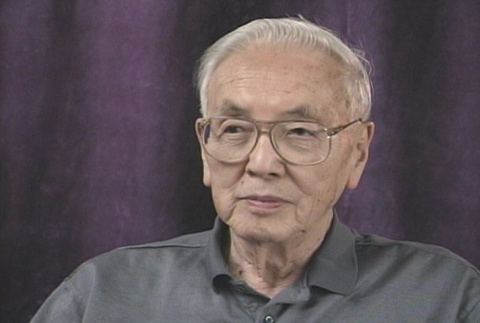56 items
56 items

Narrator Bill Hosokawa
Nisei male. Born in Seattle on January 30, 1915, and attended Washington grade school, Garfield High School and the University of Washington. He grew up as a typical Nisei, working summers in Alaska salmon canneries and Western Avenue produce brokerages to pay for his education. He became interested in writing at Garfield where he was sports …
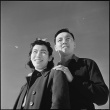
img
Japanese American couple (ddr-densho-37-466)
Original WRA caption: Heart Mountain Relocation Center, Heart Mountain, Wyoming. Alice and Bill Hosokawa, young Americans of Japanese ancestry now residing at Heart Mountain. Bill, whose father came to the United States many years ago is a recognized Nisei leader, a graduate of the University of Washington, West coast newspaper man, foreign correspondent for the Shanghai …
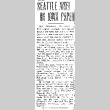
doc
Seattle Nisei On Iowa Paper (October 21, 1943) (ddr-densho-56-967)
The Seattle Daily Times, October 21, 1943, p. 22
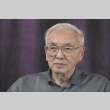
vh
Bill Hosokawa Interview Segment 19 (ddr-densho-1000-129-19)
Discussion of newspaper column written about nativists in California

vh
Bill Hosokawa Interview Segment 14 (ddr-densho-1000-129-14)
Impressions of the Puyallup Assembly Center, Washington: "What the hell are they trying to do to us?"; controversy over Jimmie Sakamoto's role in Puyallup, and being sent to Heart Mountain concentration camp, Wyoming

vh
Bill Hosokawa Interview Segment 1 (ddr-densho-1000-129-1)
Family background: father's work in Montana and California, mother's work as a school teacher

vh
Bill Hosokawa Interview Segment 8 (ddr-densho-1000-129-8)
Getting married and moving to Singapore to work for an American-style newspaper

vh
Bill Hosokawa Interview Segment 23 (ddr-densho-1000-129-23)
Finding the positive in the mass removal: Japanese Americans were forced out of ethnic enclaves into wider society

vh
Bill Hosokawa Interview Segment 17 (ddr-densho-1000-129-17)
Role as editor of a camp newspaper, the Heart Mountain Sentinel

vh
Bill Hosokawa Interview Segment 24 (ddr-densho-1000-129-24)
Moving to Colorado and working for the Denver Post, covering the Korean and Vietnam wars

vh
Bill Hosokawa Interview Segment 9 (ddr-densho-1000-129-9)
Working in Shanghai, anticipating the onset of war between the United States and Japan, and returning to the U.S.

vh
Bill Hosokawa Interview Segment 13 (ddr-densho-1000-129-13)
Description of hostile sentiment toward Japanese Americans following the bombing of Pearl Harbor

vh
Bill Hosokawa Interview Segment 12 (ddr-densho-1000-129-12)
Role of the Emergency Defense Council after the bombing of Pearl Harbor

vh
Bill Hosokawa Interview Segment 28 (ddr-densho-1000-129-28)
Combating racism: deciding whether or not a situation warrants speaking out

vh
Bill Hosokawa Interview Segment 16 (ddr-densho-1000-129-16)
Thoughts on the resisters: admired their courage, but felt that "it wouldn't gain us anything"

vh
Bill Hosokawa Interview Segment 29 (ddr-densho-1000-129-29)
Finding government papers documenting that the move to Heart Mountain was ordered as punishment

vh
Bill Hosokawa Interview Segment 18 (ddr-densho-1000-129-18)
Dilemma faced as editor of the Heart Mountain Sentinel: report the truth without provoking negative sentiment and riots

vh
Bill Hosokawa Interview Segment 6 (ddr-densho-1000-129-6)
Facing discrimination while pursuing a career in journalism: told by a professor, "No American publisher is gonna ever hire you"

vh
Bill Hosokawa Interview Segment 10 (ddr-densho-1000-129-10)
Observations about the world climate shortly before the outbreak of World War II

vh
Bill Hosokawa Interview Segment 3 (ddr-densho-1000-129-3)
Father's activism in community groups; encouraged by parents to attend a Christian church

vh
Bill Hosokawa Interview Segment 2 (ddr-densho-1000-129-2)
Speaking English for the first time in grade school, exposure to other ethnicities

vh
Bill Hosokawa Interview Segment 27 (ddr-densho-1000-129-27)
Reaction to the outcomes of the coram nobis cases; thoughts on whether the incarceration could happen again: unlikely, but possible

vh
Bill Hosokawa Interview Segment 11 (ddr-densho-1000-129-11)
The bombing of Pearl Harbor: reaction of Japanese Americans, role of the media

vh
Bill Hosokawa Interview Segment 26 (ddr-densho-1000-129-26)
Initial opposition to "reparations": felt that "it cheapened our sacrifice," later changed to support "redress" and an apology
